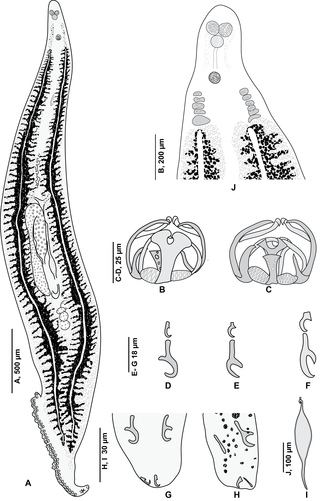
Microcotyle is a genus which belongs to the phylum Platyhelminthes and class Monogenea. Species of Microcotyle are ectoparasites that affect their host by attaching themselves as larvae on the gills of the fish and grow into adult stage. This larval stage is called oncomiracidium, and is characterized as free swimming and ciliated.

Microcotyle archosargi is a species of monogenean, parasitic on the gills of a marine fish. It belongs to the family Microcotylidae. It was first described by MacCallum in 1913 based on ten specimens. Hargis (1956) pointed out that the description and figures given by MacCallum were poor in details.
Microcotyle branchiostegi is a species of monogenean, parasitic on the gills of a marine fish. It belongs to the family Microcotylidae.

Microcotyle centropristis is a species of monogenean, parasitic on the gills of a marine fish. It belongs to the family Microcotylidae.
Microcotyle poronoti is a species of monogenean, parasitic on the gills of a marine fish. It belongs to the family Microcotylidae.

Microcotyle donavini is a species of monogenean, parasitic on the gills of a marine fish. It belongs to the family Microcotylidae.
Microcotyle pentapodi is a species of monogenean, parasitic on the gills of a marine fish. It belongs to the family Microcotylidae.
Microcotyle cepolae is a species of monogenean, parasitic on the gills of a marine fish. It belongs to the family Microcotylidae.

Sparicotyle chrysophrii is a species of monogenean, parasitic on the gills of the marine fish. It belongs to the family Microcotylidae. Its type-host is the gilt-head seabream.
Microcotyle gimpo is a species of monogenean, parasitic on the gills of a marine fish. It belongs to the family Microcotylidae.
Microcotyle sebastisci is a species of monogenean, parasitic on the gills of marine fish. It belongs to the family Microcotylidae.
Microcotyle victoriae is a species of monogenean, parasitic on the gills of a marine fish. It belongs to the family Microcotylidae.
Microcotyle toba is a species of monogenean, parasitic on the gills of a marine fish. It belongs to the family Microcotylidae.
Microcotyle tanago is a species of monogenean, parasitic on the gills of a marine fish. It belongs to the family Microcotylidae.

Pseudaxine is a genus which belongs to the phylum Platyhelminthes and class Monogenea; all its species are parasites of fish.
Gastrocotylinae is a sub-family of polyopisthocotylean monogeneans. All the species in this family are parasitic on fish.

Microcotylinae is a subfamily within family Microcotylidae and class Monogenea. This subfamily was created by Taschenberg in 1879.
Atriostella is a genus which belongs to the family Microcotylidae and class Monogenea. As all Monogenea, species of Atriostella are ectoparasites that affect their host by attaching themselves as larvae on the gills of the fish and grow into adult stage. This larval stage is called oncomiracidium, and is characterized as free swimming and ciliated.
Bivagina is a genus of monogeneans. As all Monogenea, species in the genus are ectoparasites that affect their host by attaching themselves as larvae on the gills of fish and grow into adult stage. This larval stage is called oncomiracidium, and is characterized as free swimming and ciliated.
Diplostamenides is a genus which belongs to the family Microcotylidae and class Monogenea. As all Monogenea, species of Atriostella are ectoparasites that affect their host by attaching themselves as larvae on the gills of the fish and grow into adult stage. This larval stage is called oncomiracidium, and is characterized as free swimming and ciliated.




